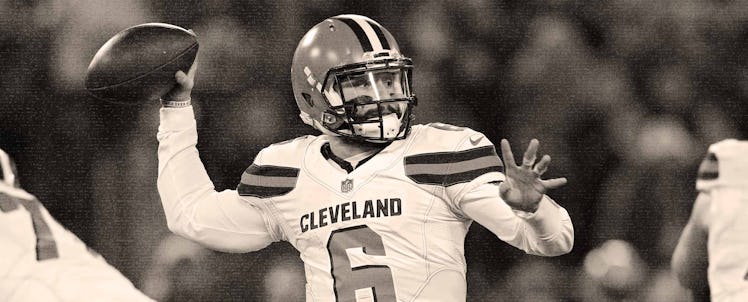Ready for the Football Season? Time to Have the Talk With Your Kids
Let's teach our kids to be football fans, but let's make sure they're honest about what they're watching

Against my better judgment, I’m teaching my boys to be fans of the Cleveland Browns. I’m fostering that fandom despite the fact that the franchise has gone through QBs faster than a chicken wing joint goes through wet wipes. I’ll teach them to cheer in defiance of the fact that Brown’s fans have a strong tradition of wallowing in heartbreak and use the phrase “Maybe Next Season” as a solemn prayer. And most importantly, I’ll make sure my boys understand the bated breath and quickened pulse we relish during a goal-line snap comes at the ugly price of damaged brains and broken bodies. Telling that truth is simply the responsible thing for any football fan to do.
The obvious question is why would I diminish the joy of rooting for an uncharacteristically amazing-looking Brown’s squad by telling my kids about chronic traumatic encephalopathy? The answer is that good parenting involves truth-telling and I’m not going to allow my kids to be misled about the impact football has on the bodies and lives of the players.
The kind of physical sacrifice that football players endure for the entertainment of the masses isn’t anything new. Sundays on the gridiron are every bit a reflection of the spectacles launched in the Roman Colosseum by Titus Flavius in the year 80. The main difference is there are far fewer crucifixions and animal maulings at First Energy Stadium on the shores of Lake Erie. But there are still gladiators. They have helmets and armor and they throw themselves against one another with tremendous forces with predictable physical consequences.
But no form of physical spectacle, either in fields or theaters, is totally free from danger. That is, after all, what makes it thrilling. When a high-wire walker crosses a canyon, it’s a thrill because we know that despite all the practice there is a chance that they will fall to their death. The walker has accepted the risk and so have we. We’ve entered into an agreement.
Why should it be any different for football? The players have accepted the risk that they will destroy their brains for sport. So I, as a fan, should have enough respect for that decision to acknowledge that the byproduct of consuming the spectacle is most likely a players dementia, and early death. And it only makes sense that my children understand this as well. Ignoring that fact is tantamount to lying to their face. It’s wrong. Should my boys accept the fact of the player’s sacrifice, how much more respect will they show for the sport? How much more empathy will they have? How much more depth will their fandom carry? I’m betting they’ll reach a new level of appreciation for it all. Or, maybe they’ll be turned off by the whole thing. At least they know the truth and make that choice themselves.
Look. It’s an exciting year for Cleveland Browns fans. Baker Mayfield, our beer-shotgunning, mustachioed scamp of QB has serious skills and a damn good chance to lead the team to the playoffs. Even sports pundits who’ve long written us off as a lost cause are saying there’s a good chance Cleveland could go all the way. I want my boys to experience the thrill of this season. I want them to cheer beside me and be a part of the vibrant community of Cleveland fandom. I want them to delight as we trounce the Steelers and humiliate Roethlisberger so terribly that he retires on the spot in sheer shame. It’s an important part of the life of our local tribe.
But I also want them to watch with clear eyes. I want them to be thoughtful consumers and understand the gravity of the game. That’s my responsibility both to my kids and to my team.